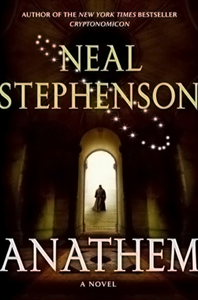
Once again, I am forced to concede that I read embarrassingly few books these days and that even when I do, I fall back on the authors most familiar to me. At least in the case of Neal Stephenson’s Anathem, it’s a solid, widely praised, book that all fans of the genre are probably expected to be familiar with.
The promotional blurbs all warn that this is a dense novel that is difficult to get to grips with. At nearly a thousand pages long, it certainly qualifies as being epic. But what makes it hard to digest is that it plunges the reader into an alien world with little exposition, complete with plenty of invented words and terms that Stephenson has devised for this book. Then there is the fact that much of the early parts of the book are set in a cloister-like environment that is cut off from the world at large, so that the outside world is nearly as much of a mystery to our narrator and to us, the readers. But most devilish of all is that the invented vocabulary seems to be inspired by Latin, so that English-speakers can vaguely guess at what is meant without having the comfort of certainty.
The narrator and protagonist of this tale is Erasmas, a young fraa of the Concent of Saunt Edhar. Gathering all of the available clues, we are able to discern that in his world of Arbre, he is an avout, one of those who have sworn vows to live apart from Sæcular society. The avout live in a manner and practice rites that we would recognize as having a highly religious flavor. Yet they represent the antithesis of religion, and the Deolaters are looked upon with disdain. Instead, their focus of study can be said to be the arts of rationality itself: science, mathematcs and philosophy. Interestingly, this isolation is imposed on the Mathic world, by which the avouts are collectively known, by the Sæcular one due to the fear of powers that the avout are said to wield. These restrictions upon the avout also include forbidding them from using most forms of technology and from ever having any children.
The plot takes a long while to really get going and some readers may be turned off by the extensive descriptions of the architecture of the concent that Erasmas lives in and their rules and way of life. Many pages are also devoted to covering Dialog between the avout on various topics, one of the main ways that the more senior avout teach the younger ones similar to the Socratic method of teaching. Since part of the pleasure of reading this novel is realizing how the plot is sneaking up on you, I won’t do you the disservice of spoiling it. But rest assured that there is a plot and eventually plenty of adventure for Erasmas and his friends.
Anathem doesn’t, strictly speaking, break any new ground in terms of science-fiction ideas. The two primary themes here are the existence of a multiverse (or to use the term coined by the avout polycosmos) due to what amounts to the many-worlds interpretation of quantum mechanics being correct and the philosophical conflict between Platonic realism and nominalism. The former is old hat since the first Star Trek series though it does rather fancifully use the idea to suggest that disciplined, trained minds can selectively collapse the quantum wave function and thereby directly manipulate reality. A further twist is that the two opposing philosophical factions seem to be capable of manipulating reality is different ways.
Still, even if it does retread old ideas, it at least daubs a new coat of paint on them by establishing within a fictional narrative. Part of the fun here is to try to work out which real-world ideas correspond to the topics that the characters talk about. If there are coincidences in terms of turns of phrase, names and anecdotal stories, the reader is led to believe that this is due to Arbre being a world parallel to our own. The worldbuilding is pretty neat too with a slow sense of wonder building as you realize that the civilization of Arbre is much older than our own and has been through many, many cycles of prosperity and apocalyptic downfall.
Unfortunately, as ambitious as this work is, the lack of true originality prevents it from being the novel of great ideas that it seems to want to be. I’m also bemused by the action adventure sequences. Don’t get me wrong, they’re in line with what appears in Stephenson’s other novels and are a lot fun to read. But even the protagonist seems Erasmas seems to be embarrassed that some parts of his story seem right out of a Hollywood movie, or a speely as he would put it. As cool as it is to have Shaolin-style martial arts experts show up in the story, you have to admit that they feel somewhat incongruous next to the intellectually-inclined avout.
My verdict: solid, entertaining science-fiction. It won’t rock your world and it’s not quite as good as Stephenson’s earlier books but it’s still a worthwhile read.